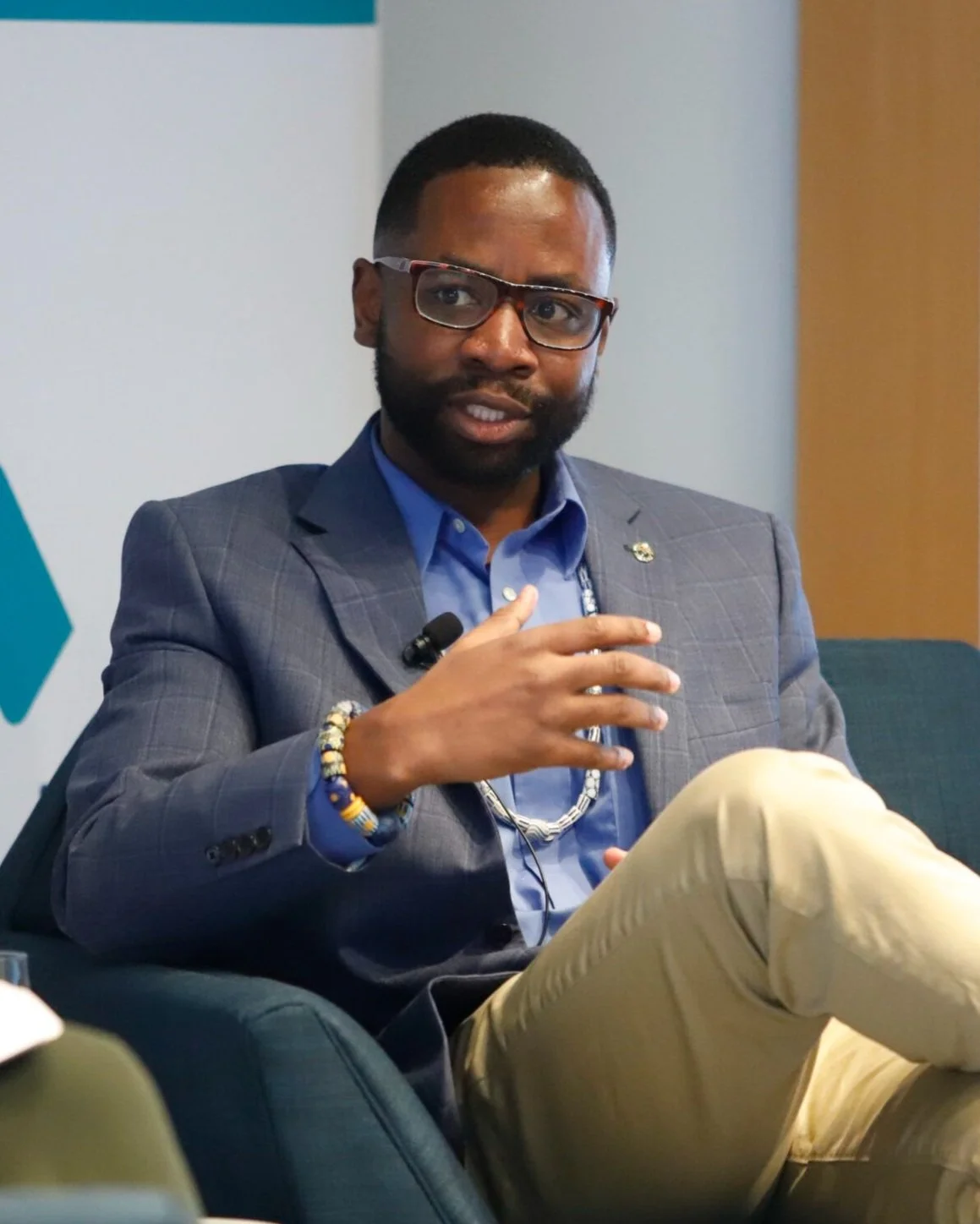Dr. Kevin Hewitt overcomes hurdles to excel in science studies
November 18, 2020
As if the harsh Canadian winter wasn’t enough for Kevin Hewitt, the newcomer had to contend with other issues after reuniting with his mother in the Greater Toronto Area in 1977.
In elementary school, he was pushed back a grade and classmates often called him the ‘n word’.
At Dr. Norman Bethune Collegiate Institute, Hewitt’s mother – Joan Vassell died in 2000 – insisted he wasn’t streamed into non-academic courses.
Late for the Harriet Tubman summer camp in the Chester Le neighbourhood and running to make up time, he and his younger brother were pulled over by police.
“What you doing running in the morning?’ he remembered being asked by an officer. “We all have our experiences, but that was my ‘Running While Black’ one.”
Despite the difficult transition, Hewitt didn’t lose sight of the goal to complete high school and pursue post-secondary education.
Complying with his mom’s request to take science courses, he struggled with Physics, considered the most difficult branch of science to study.
“In the last term in either Grade 11 or 12, I did terribly and thought I wouldn’t be able to do it,” said Hewitt. “So I went to summer school to upgrade. But it was a teacher I had the next year who was so encouraging. This lady was passionate about the subject and she was someone with training in Physics. The one thing I think that pushes students away from the subject is a teacher who isn’t trained in that area of study.”
He entered the University of Toronto in 1986 with the intention of becoming a medical doctor that was his mom’s wish.
“I took Biology and other courses, but I was required to take Physics as well,” he pointed out. “I found it not only interesting, but I was able to do well with it.”
While completing his Bachelor of Science in five years with a Physics Specialist and a Biology Major, he occasionally glanced at the Nobel Prize Physics winners’ photos in the hallway.
Not seeing anyone on that wall looking like him empowered Hewitt who was active in student politics as president of the African Canadian Students Union and became the first Black student to win the U of T Scarborough College Physics prize.
He graduated with a Doctor of Philosophy in Physics in 2000 from Simon Fraser University (SFU) in British Columbia and has been a Dalhousie University faculty member for the last 19 years.
In 2018, he became a Full Professor.
Dr. Jeff Dahn, who taught at Simon Fraser from 1990 to 1996, encouraged Hewitt to consider Dalhousie.
“Dr. Dahn was more than a mentor to me,” he said. “While I was a graduate student, we played basketball and I got to know him outside of the university setting. He had moved from SFU to Dalhousie before I graduated and he said I should come to Dalhousie if I wanted to do a post-doctorate. I always looked to Halifax as the mecca of the Black experience, so I followed his advice.”
A year after arriving in Halifax on Valentine’s Day 1999, Hewitt was appointed an Assistant Professor in the Department of Physics & Atmospheric Science.
Over the years, he has attracted more than $3 million in research funding, published over 30 papers and delivered nearly 60 presentations at conferences around the world.
He supervises the Hewitt Bionanophotonics Lab that’s overseeing the development of three projects, including an optical diagnostic tool for disease detection that is a novel technology that will allow transplant surgeons to obtain accurate measurements of liver fat content during donor surgeries.
The results will be immediate and will guide the transplant surgeon in deciding whether the liver is safe to use for transplantation.
“We are actually in the process of commercializing that for use in transplantation applications,” said Hewitt.
The Senate is a university’s senior academic governing body responsible for the approval of new programs, approving and granting degrees and diplomas, setting academic regulations and managing faculties, centres and institute’s reviews.
In 2015, Hewitt was elected Senate Chair.
Within his first two years, the Senate was expanded from 79 to 97 members and a motion seeking to diversify and make Senate more inclusive was passed. The changes included a designated seat for a faculty member selected by the Black Faculty & Staff Caucus and the Indigenous Council.
There are 10 African-Canadian members in the Senate.
“The conversation has changed dramatically,” said Hewitt who last year was elected to a new three-year term. “Diversity and inclusion are discussed in a way that I think makes it feel the culture has changed. You know there’s a culture change when the usual suspects are not raising the issue of the lack of diversity in a program or something like that.”
It was also in his capacity as Senate Chair that Hewitt joined then Dalhousie president Dr. Richard Florizone in 2016 to commission a Scholarly Panel, chaired by Dr. Afua Cooper, to examine Lord Dalhousie’s History on Slavery and Race.
George Ramsay, who described Black people as ‘idle and pre-disposed for slavery’, used the proceeds of slavery to set up the university in 1818 and actively sought to banish Black refugees from Nova Scotia.
In September 2019, Dalhousie apologized to Black Nova Scotians for its founder’s racist actions and views.
“We are now beginning the difficult but important conversations and work that will tell us what kind of people we are, what reconciliation looks like and what world we want to live in,” Hewitt said at the ceremony to mark the unveiling of the panel report.
Before leaving British Columbia where he co-founded the Association of Students of African Descent and the St. Vincent & the Grenadines Association of Greater Vancouver, Hewitt organized an interactive science event – Imhotep Legacy—for kindergarten to Grade 12 students.
“The theme was ‘Seeing is Believing’? and it was about how we can understand 3D imaging,” he said. “We also showed the participants Black scientists because we wanted them to see themselves reflected in the field.”
Hewitt took the program to Nova Scotia.
Shortly after arriving in Halifax, he collaborated with Wayn Hamilton, who was with the Department of Education African-Canadian Services Division, on a STEM outreach.
“In that first year, we brought all the students to Dal,” he noted. “But we soon realized that summer program wasn’t going to have the impact we wanted. So we transitioned to an afterschool program where mentors were identified. Barbara Hamilton-Hinch, who led the university’s Black Student Advising Centre, encouraged any African-Canadian student in STEM to join our program as mentors and they would go to the school identified by Wayn.”
Led by a volunteer board of directors from Dalhousie and the community, the Imhotep Legacy Academy (ILA) weekly afterschool program promotes the educational, social and personal development of young African Nova Scotian Grades seven to nine learners by engaging them in STEM enrichment activities with the aim of enhancing the representation of Black professionals in the myriad science fields.
“We expanded the program to Truro and other places in the province that are close to a university with Black faculty that we partnered with and they identified mentors,” said Hewitt who stepped down as the president of the program in 2013. “We were then asked to extend the program to high schools through virtual tutoring. Learners from Grades seven to 12 are now engaged regularly and I firmly believe that the outcomes we are having now is because of that continuous engagement. We are not just seeing them for a week in the summer at a camp. They are seeing these mentors that look like them at a crucial time in their academic careers.”
To reduce the financial barrier African Nova Scotian students pursuing studies in STEM-related fields face, the ILA partnered with Dalhousie and TD Bank to create a four-year renewable scholarship for ILP graduates entering the university.
The total amount awarded upon entry to Dalhousie is determined by the student’s grade at the time the scholarship is promised. The scholarship accumulates for every year of participation in ILA’s programs or other STEM-related initiatives.
“By the time they get to university, the young people have been in an eco-system where they see this isolation, that would otherwise be present, is removed because they are seeing other kids like them who like Physics and Math,” said Hewitt. “They also see the university students who look like them doing these subjects and professors that look like them. There’s effectively being a tri-mentoring program established as well so that professors mentor the mentors who mentor the learners.”
Hundreds of youths have passed through the program since it was introduced in Nova Scotia 17 years ago.
“What is important to me is the amount of time we spend with the learners than the number of learners,” said Hewitt. “Also critical to this program’s success is the funding we have received over the years. It required a funder with a long-term vision who was willing to invest, knowing there wouldn’t be an immediate return on that investment.”
Nova Scotia’s first Black Lieutenant Governor Mayann Francis is a big booster of the program.
She invited ILA members to Government House on a few occasions to speak about the program and brought funders to the table to support it.
“She also brought in the Dean of the Faculty of Medicine in because we were trying to get more students into that department,” said Hewitt who was presented with a Harry Jerome Award in 2014 for Professional Excellence. “We established these summer research scholarships out of that engagement. In every faculty, a Black student can go into the lab to do research which builds their resume for graduate school.”
Even though he left St. Vincent & the Grenadines 43 years ago, Hewitt has fond memories growing up with his maternal grandmother in the Caribbean.
In the early 1960s, his mother left the island as part of the Windrush generation that went to England to help fill labour shortages after World War II.
A few months after the birth of her second child in 1967, Vassell sent him and his two-year-old sister to the Caribbean.
The separation lasted a decade before they were reunited in the Greater Toronto Area.
“Grandma constantly reminded us of our mother and the one gift I remember her sending me from Canada was this red sports car,” he said. “I think the Caribbean was the best place for me to be raised at that time in my life. I was well taken care of by granny to the point of being a little spoiled. I enjoyed school and skipped a grade, I went to church on Sunday mornings, fried liver and onions and I relished going to the beach regularly.”
Within a year of Hewitt joining his mother who birthed two other children, her husband moved out of the home leaving Vassell – an active member of the defunct Harriet Tubman Community Organization -- to raise four children.
Raising children alone while holding a busy full-time job could be challenging as Hewitt has found out.
He is a single father caring for his seven-year-old daughter and 10-year-old son. He has two other daughters, a 28-year-old residing in Peterborough and a 14-year-old in Vancouver.






